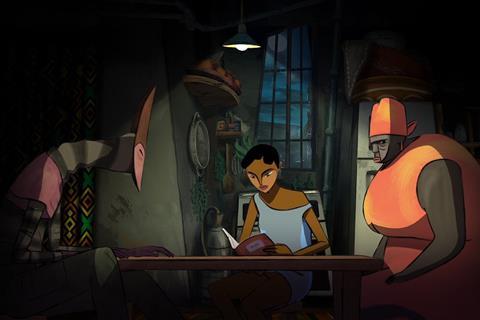Stunning feature animation debut depicts the horror of war from a female perspective

Dir: José Miguel Ribeiro. Portugal/Belgium/Netherlands/France. 2022. 83 mins.
Three generations of women from the same family find their lives and loves caught up and torn apart by Angola’s seemingly endless civil war in this stunning feature animation debut from José Miguel Ribeiro (winner of Locarno’s Leopard of Tomorrow in 2016 for his short film Fragments). Spanning decades and dimensions, the film tells of Nayola (voiced by Elisângela Kadina Rita), a young mother who makes the impossible decision to leave her two year-old daughter, Yara, to search for her husband, missing in battle. Years later, Yara (Feliciana Délcia Guia) is a teenager who channels her anger at the world into combative rap; her grandmother Lelena (Vitória Adelino Dias Soares), bones heavy with accumulated grief, watches anxiously as the authorities train their sights on her. Like the striking and vivid graphic style of the animation, Nayola is bold and thrilling storytelling which combines its forceful message about the legacy of living through war with an almost mythic quality.
An economical animation style which evokes the simplicity and impact of line-drawn illustrations
As Ari Folman’s Waltz With Bashir demonstrated, animation can explore the horrors, and the horrifying beauty, of war in ways that live-action cinema might struggle to achieve. But while Nayola’s vision of combat is no less disorientating and hallucinogenic than that of Folman’s film, it has the distinction of being told entirely from a female point of view. Crucially, these are women who are not passive, but who play an active role, either on the battlefield or in the arena of protest. This female perspective may be a selling point for a film which takes an unflinching approach to violence, limiting it to the young-adult and adult market, yet is visually distinctive and emotionally potent enough to make waves on the festival circuit and perhaps elsewhere.
Nayola boasts an economical animation style which evokes the simplicity and impact of line-drawn illustrations, but what strikes first is the use of colour. Tropical tones — lime and lemon, papaya orange and deep water blue — give way to a wash of crimson as the war takes its toll. There’s something so rich, so saturated about the hues that you almost feel that you could taste them. Equally impressive, although not foregrounded to quite the same extent, is the use of sound. The first scene on the streets of the Angolan capital Luanda, the backdrop and inspiration for Yara’s music, is accompanied by a three-dimensional soundscape which is every bit as vital and complex as the visual representation of the city.
The legacy of war, according to a film which slips in and out of mysticism, is that people learn to wear masks to hide themselves. Relatives no longer recognise each other — a terrific scene involving an uncle and a nephew, on opposite sides of the conflict, explores this idea, but there is another, more poignant encounter later in the film. Fighters embrace their animal instincts in order to survive. In Nayola’s case, a lonely jackal comes to represent the more feral and dangerous aspects of her personality. And when she is finally reunited with her daughter, the jackal is all that Yara can see.
Production companies: Praça Filmes, S.O.I.L. Productions, JPL Films, Il Luster Films
International sales: Urban Distribution International, sales@urbangroup.biz
Producers: José Miguel Ribeiro, Ana Carina Estrói, Camille Raulo, Jean-François Bigot, Linda Sterckx, Geert Van Goethem, Arnoud Rijken, Michiel Snijders
Screenplay: Virgílio Almeida, from The Black Box by Mia Couto, José Eduardo Angualusa
Music: Alex Dibicki
Main voice cast: Elisângela Kadina Rita, Catarina André, Marinela Furtado Veloso, Feliciana Délcia Guia, Vitória Adelino Dias Soares
























